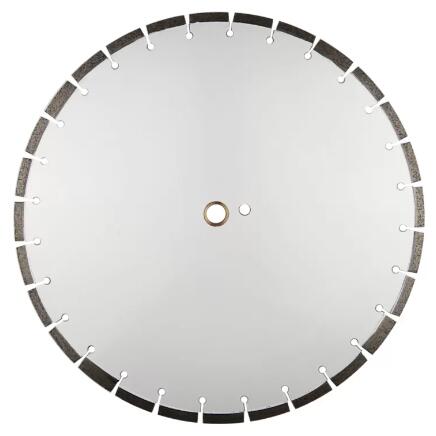1 What is a diamond blade?
A diamond blade is a high-alloy, toughened blade which has been bonded with fine metal and crystals of diamonds to cut hard and abrasive materials. Good quality diamond blades are sharp enough to offer clean and precise finishes when cutting tiles, paving slabs and other flooring materials.
Diamond blades are widely used by tiling and landscaping contractors in the construction industry. Many diamond blades can be used with angle grinders, battery saws, petrol saws and table saws.
2 What are the benefits of using a diamond blade?
A diamond blade can offer the safest, fastest and most efficient way of cutting construction materials, from granite to asphalt. When selected and used correctly, diamond blades last longer than other blades and offer users increased productivity.
3 What is a diamond blade used for?
A diamond blade can be used to cut the following construction materials with an angle grinder or cut off saw:
Asphalt
Brick
Ceramic
Concrete
Glass
Granite
Marble
Natural stone
Porcelain
Slate
Vitrified tiles
4 How do diamond blades work?
Corediam Diamond blades don’t cut, they grind! The exposed diamond crystals do the grinding work. The metal matrix or bond holds the diamonds in place. Trailing behind each exposed diamond is a “bond tail” which helps to support the diamond. As the blade rotates through the material the exposed surface of the diamonds grind the material being cut into a fine powder.
After several thousand passes through the material being cut, the exposed diamonds begin to crack and fracture. The matrix holding the diamond also begins to wear away.
Eventually the diamond completely breaks up and its fragments are swept away with the material that it is grinding.
As the diamond wears and fractures, controlled erosion of the metal bond containing the diamond exposes new sharp diamond points. This cycle of erosion and exposure continues until all of the diamond and metal bond section of the segment is gone. Once the cutting section is consumed the blade will no longer grind letting the operator know it is time for a new blade.

5 How long will a diamond blade last?
If you work with the same low quality diamond blade under poor conditions (cutting the hardest materials without knowing the technique, dry cutting, etc.), it could be half or less. By using a professional quality diamond blade, the best tile cutter, under normal conditions, it can reach over 120 working hours.
6 What are the main types of diamond blades?
Type of diamond blade | Ideal for cutting |
Segmented | Varies depending on shape and size of gullets |
Turbo rim | Harder materials, e.g. granite and baked clay |
Continuous rim (wave cutter) | Fragile materials, e.g. tiles |
Electroplated (segmented/continuous rim) | Very hard materials, e.g. marble or ceramic tiles |
7 How do I choose a diamond blade?
First off, identify the type of material you will be cutting and choose the correct blade using the table below. As a rule, harder materials require softer blade segments. Likewise, abrasive materials require harder segments.
If you will be cutting more than one material, when choosing your blade select the material you will cut the most. While general purpose blades can be a compromise, they will not cut hard materials as efficiently or last as long as blades made specifically for those materials.
Price is another important consideration. More expensive diamond blades should cut faster and last longer than cheaper blades. Cutting corners when buying a blade can actually cost you more in the long run. Cheaper blades will also fail to cut as smoothly or efficiently.





Comments
All Comments ( 0 )